31 December 2005
Made it out. The flight was five hours late, but it came and I've just arrived in the Solomon Islands. Lots of interesting things to write about here but I'll need a little time to gather my thoughts.
29 December 2005
Mea culpa. It was wrong, deeply wrong, to count my eggs before they had hatched. I guess I just assumed that people involved with Air Nauru--let's just say based on their performance on this issue, it's no surprise they lost their plane--would be at least slightly willing to help me find a solution to my travel problem. But no. Left up to them, I would be here in Nauru for the foreseeable future.
The flight this Saturday to Brisbane is the last they have scheduled, and according to the manager of the office here, who was sympathetic if completely impotent to help, the last they will charter for at least a few weeks. So it was this or nothing. But I can’t go to Australia--there is no connecting flight to Fiji that I can catch without having an Australian visa. Instead of offering to help get me an electronic visa, which even a travel agent can do, the Air Nauru people in Melbourne said that I have to apply for it in Nauru. Only the Australian visa office here is closed until Jan. 2. In short, they would not even let me board the plane. Unbelievable.
Not one person I talked to was able to help or recommend another option. I’m leaving Nauru on Saturday only because I kept snatching papers out of people’s hands. Through this I learned that the plane to Brisbane also stops in Honiara in the Solomon Islands, where I will not need a visa. Not where I needed to go, but closer to the rest of the world than Nauru. From there, by pushing and prodding and generally making a giant nuisance of myself, I forced the Air Nauru agent in Melbourne to book me on an Air Vanuatu flight to Port Vila, Vanuatu, on Jan. 5, which was my next destination anyway. I’ll skip going back to Fiji and will lose the cost of that flight and all six nights of hotel that I booked in Fiji. A tough blow, but more manageable than three more weeks here. So now I have to read up on the Solomons--I’ll be there for five unscheduled days. It was not my best option. It was my only option.
I guess it pays in these situations to be calm and creative and flexible and whatever. But I have to confess that several times during the three hours I spent in the Air Nauru office today I was a moment, a single synapse-firing, away from going all smashy-smashy and letting loose a torrent of blinding profanity and invective. And it would have felt pretty good. Now I’ll need a little time to let that frustration work itself out so I can see this island clearly enough to write more about it.
But let’s not get ahead of ourselves. I won’t be sure I’m ever leaving Nauru until I see it receding into the ocean from the window of a plane.
The flight this Saturday to Brisbane is the last they have scheduled, and according to the manager of the office here, who was sympathetic if completely impotent to help, the last they will charter for at least a few weeks. So it was this or nothing. But I can’t go to Australia--there is no connecting flight to Fiji that I can catch without having an Australian visa. Instead of offering to help get me an electronic visa, which even a travel agent can do, the Air Nauru people in Melbourne said that I have to apply for it in Nauru. Only the Australian visa office here is closed until Jan. 2. In short, they would not even let me board the plane. Unbelievable.
Not one person I talked to was able to help or recommend another option. I’m leaving Nauru on Saturday only because I kept snatching papers out of people’s hands. Through this I learned that the plane to Brisbane also stops in Honiara in the Solomon Islands, where I will not need a visa. Not where I needed to go, but closer to the rest of the world than Nauru. From there, by pushing and prodding and generally making a giant nuisance of myself, I forced the Air Nauru agent in Melbourne to book me on an Air Vanuatu flight to Port Vila, Vanuatu, on Jan. 5, which was my next destination anyway. I’ll skip going back to Fiji and will lose the cost of that flight and all six nights of hotel that I booked in Fiji. A tough blow, but more manageable than three more weeks here. So now I have to read up on the Solomons--I’ll be there for five unscheduled days. It was not my best option. It was my only option.
I guess it pays in these situations to be calm and creative and flexible and whatever. But I have to confess that several times during the three hours I spent in the Air Nauru office today I was a moment, a single synapse-firing, away from going all smashy-smashy and letting loose a torrent of blinding profanity and invective. And it would have felt pretty good. Now I’ll need a little time to let that frustration work itself out so I can see this island clearly enough to write more about it.
But let’s not get ahead of ourselves. I won’t be sure I’m ever leaving Nauru until I see it receding into the ocean from the window of a plane.
27 December 2005

It can be a little jarring to hear so many Christmas songs when I’m on a miserably hot island just a few miles south of the equator, where snow, Christmas trees and one-horse open sleighs are as fictional as Santa, but I’ve heard little else out of Nauru the last few days. Most everything on the island was shut down between Friday and today, but I made an excursion to the good grocery store on the other side of the island--perched precariously with my bags of instant noodles and cereal bars on the open back of a flat-bed truck--so I was good on food and water. But there was little else to do, so I spent most of the last four days reading and wandering around the island taking pictures and taking advantage of the few people who stopped and offered me rides. The quantity of traffic has noticeably declined since I have been here as the gasoline shortage gets more and more acute. It’s usually the first thing on people’s minds.
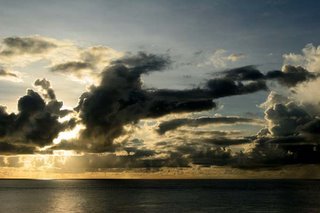
This country is so small that I’ve now seen just about all of it. It’s worth noting that you can hear and see the ocean from almost anywhere on the island and from each vantage point there is nothing--literally nothing, all the way around the island--on the horizon. No other islands, no ships, no nothing. I’ve never seen anything quite like it.
I got a chance at the end of last week to tour Topside, the mined-out interior of the island, with a frank and interesting Nauruan named Joe Hiram. He knows the mining operation inside and out, having formerly been general manager of Nauru Phosphate Corporation (NPC) and a member of parliament for a brief period. He is now engineering manager of RONPHOS, or Republic of Nauru Phosphate, NPC’s successor.
The next day, which was Christmas Eve, I was wandering north when I bumped into Joe again, on the first green (term used very loosely, I’ll explain why) of Nauru’s nine-hole golf course. I tagged along with his friendly foursome through the rest of their round.

First designed when dapper Englishmen in white suits and flat-brimmed straw hats ran the phosphate trade, the golf course has managed to hold on and I saw several groups playing through. It is as hardscrabble a golf course as I have ever seen--the fairways, which criss-cross one another to make nine holes in the space of one hole on larger courses, are covered is weeds, bare patches, small piles of trash. The occasional motorcycle cuts through.
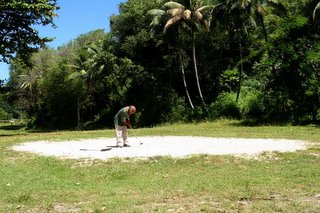
The greens are actually made of coral sand and course rules say you can smooth out the path between your ball and the hole twice per hole, so everyone carries a flat-bladed shovel in their bags. The hazards are more or less depressions that are never mowed and a ball that goes into them tends never to come out.
The seventh hole is particularly rough. Maybe 60 yards from tee to hole, it abuts the poorest area of Nauru, called "Location," where the mine laborers from Kiribati and Tuvalu (they’re called K&Ts) have traditionally been housed. At any rate, it is far easier to toss trash over the wall than haul it up to the dump on Topside, so the hazard in front of the green is especially dire.
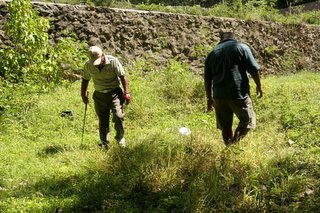
I was helping look for lost ball in this mire when I noticed the ground I was standing on was especially bouncy. I realized I was standing on an overgrown pile of rusted-out mattress springs.
The foursome had a great time playing through and talking trash about their standing beer-per-hole bet. There’s something a little heroic about hanging on to the homegrown, hard-to-love course. But there are worse ways to spend a Saturday in Nauru. The country even sends a golf team to the South Pacific Games (I doubt Vijay Singh, who is from Fiji and is one of the best golfers in the world, competes in those). But unaccustomed to long courses and greens with grass on them, they tend to get thrashed.
Nauru actually finds its greatest success in weightlifting and power lifting, in which the country excels at the regional and even global level. It is said that these sports suit the stocky Nauruan physique. The other day in parliament, the minister for sports, who is also the minister for health and for transportation, read off an impressive list of accomplishments and titles for the year.
More travel difficulty: I am booked to leave on Saturday, which takes me to Brisbane. I'm still trying to explain why I shouldn't pay $1000 to get from there to my original destination in Fiji. The hotel in Fiji is charging me for the days I'll miss, which I tried to cancel (now I realize I will need one of those days back, provided I make the one-hour connection time in Brisbane). Anyway, still nothing is settled and I don't suppose it will be until the moment I arrive back in Fiji, which will maybe be either Sunday or Monday.
22 December 2005
My hopes for a flight back to Fiji next week have fizzled. The next flight goes to Brisbane next Saturday, Dec. 31, and I'll be on it. That will likely be the last flight out of Nauru for two or three weeks, so it's literally my last chance. I'm told there is a flight to Fiji from Brisbane the next day.
I'll likely have to pay for a hotel room in Brisbane that night, but it is New Year's Eve, so I don't know that I'll find one. May be sleeping on my bags in the airport that night. I'm now in the process of trying to convince the airline that I should not have to pay for the flight from Brisbane to Nadi.
At any rate I've been struggling just a bit lately to keep a sense of humor about this. Another week ...
Anyway, I think it is pretty likely that everything in Nauru, including the Internet office, will be closed until Wednesday. So long for now, folks. Happy Holidays.
p.s. I'm told that the hotel I am staying at sort of hosts an all-night party outside for Christmas. I've seen some workers there preparing speakers the size of compact cars. Incredibly loud. Christmas music. All night long. I may reconsider that 400-mile canoe trip.
I'll likely have to pay for a hotel room in Brisbane that night, but it is New Year's Eve, so I don't know that I'll find one. May be sleeping on my bags in the airport that night. I'm now in the process of trying to convince the airline that I should not have to pay for the flight from Brisbane to Nadi.
At any rate I've been struggling just a bit lately to keep a sense of humor about this. Another week ...
Anyway, I think it is pretty likely that everything in Nauru, including the Internet office, will be closed until Wednesday. So long for now, folks. Happy Holidays.
p.s. I'm told that the hotel I am staying at sort of hosts an all-night party outside for Christmas. I've seen some workers there preparing speakers the size of compact cars. Incredibly loud. Christmas music. All night long. I may reconsider that 400-mile canoe trip.
21 December 2005
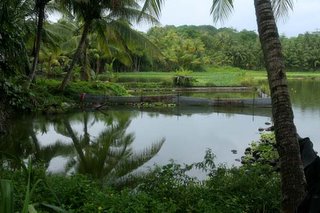
Here is the Buada Lagoon I mentioned before. You can see the enclosure that is probably used to raise milkfish. At one time, the entire lagoon was sectioned off, but now I'm told that there are probably only two families that still do this.
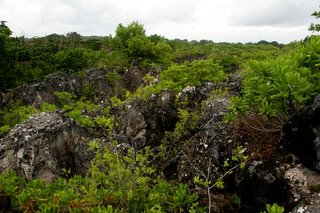
This is what much of the areas of the island that were mined a long time ago--this was probably mined in the 50s and 60s--looked like. While a lot of it is overgrown, in between these dense and incredibly jagged limestone towers are pits that can drop five stories in some cases. Any place that has been mined is all but impassable.
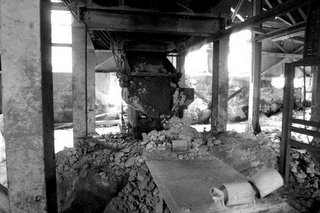
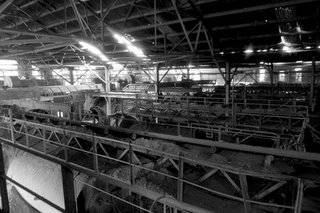
And here is a couple of shots of the decrepit phosphate works. All of this is supposed to be fixed up with money from an Australian fertilizer company early next year, at which point the government will begin mining whatever phosphate is left. It is in pretty atrocious shape. But there is akind of beauty in this decay, I think.
No news on flights yet. I contacted the U.S. Embassy, which is in Suva, Fiji. I registered with them before I left, but I don't think anyone looked at that list or tried to contact me to see that I would be able to get out. Their advice? Get out. Now. Thanks. Is 400 miles too far to paddle in an outrigger canoe?
There is a flight to Australia this weekend, but it is full and I would be responsible for getting from there back to Fiji. Air Nauru says they will have a flight next week and I have tried to make clear that I WILL be on it. But there's no real telling where it will go and no guarantee I will have a seat (although I'm not above serving drinks or clinging to the wing at this point). Eh. Tomorrow will take care of itself. I just keep repeating that, but I'm not sure it means what they think it means.
20 December 2005
Well, no news yet on a flight out. Rumor has it they're trying to line up a Nauru-Tarawa-Nadi flight for next week (which is the same way I came in). It would be a lot to hope for I think, but what else is there to do here.
Actually, I've been really busy lately meeting with government people, hiking around, sitting in on a session of their 18-member parliament. At parliament, Air Nauru was certainly a topic of discussion, but in truth it has to get in line behind the island's other problems.
Spent a day hiking around an inland lagoon up on a hill, called Buada, where the locals used to (I saw only a little evidence for it now) raise milkfish. At one point, the entire lagoon was subdivided into family plots. People would catch milkfish larvae in the ocean, rear them in coconut shells and then raise them in the pond. It seems like a part of Nauruan culture, along with the capture and taming of frigate birds, that fell off dramatically during the rich years and only now are starting to be revived. What better to fill the void left by cash than with traditional culture?
And on the way back I took a choking, dusty and probably very dangerous trip through the now decaying Nauru phosphate works--giant crushers, dryers, storage facilities. They have investors and plans to clean up and fix all this decrepit heavy machinery so they can start mining again. Whatever estimates I've heard strike me as low--this stuff is in bad shape. But I will defer to the mining executives.
Got pics to post from that day, but need a little time to run through them.
Actually, I've been really busy lately meeting with government people, hiking around, sitting in on a session of their 18-member parliament. At parliament, Air Nauru was certainly a topic of discussion, but in truth it has to get in line behind the island's other problems.
Spent a day hiking around an inland lagoon up on a hill, called Buada, where the locals used to (I saw only a little evidence for it now) raise milkfish. At one point, the entire lagoon was subdivided into family plots. People would catch milkfish larvae in the ocean, rear them in coconut shells and then raise them in the pond. It seems like a part of Nauruan culture, along with the capture and taming of frigate birds, that fell off dramatically during the rich years and only now are starting to be revived. What better to fill the void left by cash than with traditional culture?
And on the way back I took a choking, dusty and probably very dangerous trip through the now decaying Nauru phosphate works--giant crushers, dryers, storage facilities. They have investors and plans to clean up and fix all this decrepit heavy machinery so they can start mining again. Whatever estimates I've heard strike me as low--this stuff is in bad shape. But I will defer to the mining executives.
Got pics to post from that day, but need a little time to run through them.
18 December 2005
Certain things become more difficult when you're on a hunk of rock in the middle of the Pacific.
The power station in Nauru runs on diesel, and the supply of diesel is dependent on ships coming in. Therefore, power is rationed and blinks on and off. No problem--it is usually on in the evenings, and I have both a flashlight and a computer with a battery. The water supply relies on power for pumping, so that is variable too. So last night, just as I finished soaping up in the shower, the water cut out (but the power stayed on--odd). Again, no problem. I rinsed off with a couple of buckets of water I filled earlier in the day to use to flush the toilet. There is no public transportation, but so far I have met a few nice people willing to give me rides or at least arrange passage for me with someone else. Everywhere else I walk, which is manageable provided I have enough bottled water.
So you make do. I had been off the Internet for several days owing to a severe stomach illness and the fact that the Internet office was closed all weekend. So I had missed this little piece of news until yesterday when a source mentioend it to me and today when I finally read the whole story ...
Nauru's Only Jet Grounded
Melbourne Herald Sun
That's right, my government has gone and repossessed the plane that I flew here on, the only plane with regular service to Nauru. So begins a period of uncertainty. They know little right now at the Air Nauru office, but have mentioned, as the article does, that some other airline may be running some kind of service to the island. What's more, there are a number of Australian security personnel on the island and they will have to be spelled at some point. Maybe I could hitch a ride with them. So I suppose I'll be able to get out sometime between now and Dec. 29, when I had originally planned to leave, or Jan. 5, when I am scheduled to fly from Fiji to Vanuatu.
I suppose the only problem is that there is no guarantee that the new air service will resume the old route and fly me back to Fiji. In fact, my guess is that it would fly into Brisbane instead. There's a Nauruan saying, "Tomorrow will take care of itself." Hmph.
In the meantime, I'm meeting some interesting people and getting some good interviews. I suppose that's something. Will get up some pics soon.
The power station in Nauru runs on diesel, and the supply of diesel is dependent on ships coming in. Therefore, power is rationed and blinks on and off. No problem--it is usually on in the evenings, and I have both a flashlight and a computer with a battery. The water supply relies on power for pumping, so that is variable too. So last night, just as I finished soaping up in the shower, the water cut out (but the power stayed on--odd). Again, no problem. I rinsed off with a couple of buckets of water I filled earlier in the day to use to flush the toilet. There is no public transportation, but so far I have met a few nice people willing to give me rides or at least arrange passage for me with someone else. Everywhere else I walk, which is manageable provided I have enough bottled water.
So you make do. I had been off the Internet for several days owing to a severe stomach illness and the fact that the Internet office was closed all weekend. So I had missed this little piece of news until yesterday when a source mentioend it to me and today when I finally read the whole story ...
Nauru's Only Jet Grounded
Melbourne Herald Sun
That's right, my government has gone and repossessed the plane that I flew here on, the only plane with regular service to Nauru. So begins a period of uncertainty. They know little right now at the Air Nauru office, but have mentioned, as the article does, that some other airline may be running some kind of service to the island. What's more, there are a number of Australian security personnel on the island and they will have to be spelled at some point. Maybe I could hitch a ride with them. So I suppose I'll be able to get out sometime between now and Dec. 29, when I had originally planned to leave, or Jan. 5, when I am scheduled to fly from Fiji to Vanuatu.
I suppose the only problem is that there is no guarantee that the new air service will resume the old route and fly me back to Fiji. In fact, my guess is that it would fly into Brisbane instead. There's a Nauruan saying, "Tomorrow will take care of itself." Hmph.
In the meantime, I'm meeting some interesting people and getting some good interviews. I suppose that's something. Will get up some pics soon.
14 December 2005
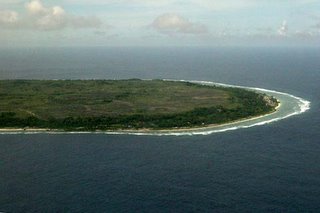
Flying into Nauru you can almost, depending on which side of the plane you are sitting on, see the entire country. I managed to capture about half of it in this image. Although the edge of the island may look like a beach, there is precious little sand there. It is a jagged limestone platform, and the surf is strong, so there are precious few places to swim without risking scrapes, bruises or worse. Then there is the green coastal belt, rich, overgrown, teeming. Almost all the people in Nauru live on this fringe and the population is pretty dense all the way around (that's 12 miles). And if this was all of the island you ever saw, you'd never get the impression that something was wrong here. But as you can see by the gray patches on the left of the picture above, the green of the coastal belt stops rather abruptly. The rest of the island is an impassable wasteland studded with ancient limestone pinnacles.
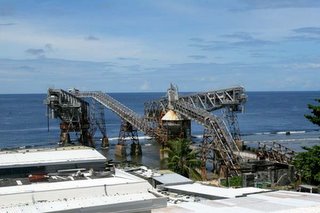
This is the key element in everything that has happened to Nauru. This giant cantilever once loaded thousand and thousands of tons of phosphate into enormous tankers offshore (tied to some of the deepest deep water moorings in the world). This is the old one, which has been out of commission for decades. There are two others nearby and I'm told they still work, even if they are clearly idle now. The cantilevers are the island's only real landmarks. They will have to be refurbished, I think, if Nauru is to begin secondary mining. This plan to pull phosphate out of the remaining low-grade deposits is the keystone, as far as I understand it so far, in Nauru's return to solvency and basic services. I do not know enough to judge the wisdom or practicality of this plan.
I'm going to be storming the government offices for interviews tomorrow. I have already set up a couple. But the bigger challenge will be connecting with regular Nauruans, who either ignore me or don't seem to like me much.
On the plus side, the hotel rents bootleg DVDs shot with handicams in theaters. It's not a great idea to walk around at night--not because of crime but because many Nauruans train their dogs to attack, which seems an odd choice on an island with 10,000 people and almost no crime. But the power is usually on at night, so with my computer I can catch up on a couple of movies I've missed. Outside of occasional nausea when the filmmaker shifts in his seat.
12 December 2005
I've just arrived in Nauru, and I'll have to draft something more detailed to provide some background, but the upshot is that Nauru is an isolated island in the Central Pacific just south of the equator. Nothing around for 400 miles in any direction. It was once rich, one of the richest countries in the world, on the sale of phosphate rock, and that mining operation destroyed most of the island. But now the phosphate is gone. The money was frittered away in bad investments. Their traditional, sustainable ways of life were long forgotten. And everything they built, the consumption-driven lifestyle created by their entrance into the global economy, has gone to seed. The hotel where I am staying for now, the Menen, was once one of the finest in the Pacific, with a great wine list and full convention facilities. Now it is simply disintegrating, although the rooms are still clean and comfortable, if increasingly shabby. But the sad reality here, and the environmental story I've come to tell, is the story of a place and a people spoiled then despoiled as a result of environmental (mis)management.
But I think it is going to be hard. There is electricity, even in the upscale hotel, for just a few hours a day. That goes for water, too. And fresh fruits and vegetables. And because petrol is so scarce, there is no public transport or taxis. You walk or hitch, which is what I have been doing all day. Nauruans don't seem to much like outsiders, so I have been getting the stink-eye all day. These Nauruans are in the process of finding a way, any way, to make their existence on the island sustainable. It has led to a number of embarassing financial misadventures. This, and the fact that it was outsiders (English and Australians) that first started the mining operation, make them weary of strangers, although I'm told they make great friends once they warm up to you.
Is Nauru a parable for the whole world? Maybe. Is it a vision of the future of other resource-dependent countries (Brunei, the Middle East, etc.)? Perhaps. That's what I've come here to find out and I have a sneaking suspicion it is going to be a long, hot couple of weeks. More background and a few pictures to come.
p.s. I've discovered the worst invention in the history of the world. There is a woman waiting to use a computer here in the one Internet office in Nauru, and she has two two-year-old children with her. One of them is wearing sandals that squeak and squeal like a doggie toy with every step. From now on, we will refer to this as Nauruan squeak torture.
But I think it is going to be hard. There is electricity, even in the upscale hotel, for just a few hours a day. That goes for water, too. And fresh fruits and vegetables. And because petrol is so scarce, there is no public transport or taxis. You walk or hitch, which is what I have been doing all day. Nauruans don't seem to much like outsiders, so I have been getting the stink-eye all day. These Nauruans are in the process of finding a way, any way, to make their existence on the island sustainable. It has led to a number of embarassing financial misadventures. This, and the fact that it was outsiders (English and Australians) that first started the mining operation, make them weary of strangers, although I'm told they make great friends once they warm up to you.
Is Nauru a parable for the whole world? Maybe. Is it a vision of the future of other resource-dependent countries (Brunei, the Middle East, etc.)? Perhaps. That's what I've come here to find out and I have a sneaking suspicion it is going to be a long, hot couple of weeks. More background and a few pictures to come.
p.s. I've discovered the worst invention in the history of the world. There is a woman waiting to use a computer here in the one Internet office in Nauru, and she has two two-year-old children with her. One of them is wearing sandals that squeak and squeal like a doggie toy with every step. From now on, we will refer to this as Nauruan squeak torture.
11 December 2005
A few people have asked about the weather here and I've avoided saying anything about it because I've seen what it is like in New York.
I'm off to Nadi tonight and then on to Nauru tomorrow morning. It was only through some amazingly lucky acrobatics that I managed to get a journalist's visa to enter Nauru. They have some pretty severe communication problems. The Department of Immigration is unable to communicate with the Foreign Affairs office, even though they are probably in the same building, and the fax of my passport I sent three weeks ago disappeared into the ether until Friday morning. Anyway, after a call to the Director of Immigration, I got things straightened out and he's used a loophole to get me an emergency visa, which he sent through the airline's computer system (and he sent a paper copy on the flight that arrives from Nauru today for me to pick up when I check in tomorrow). Anyway, it was only through about four turns of luck and one well-timed phone call that I will be allowed to go there. I'll be providing some background once I arrive, but I'm not sure how reliable the Internet service will be.
In the meantime, here is Suva Harbor last night.
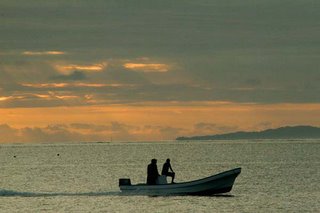
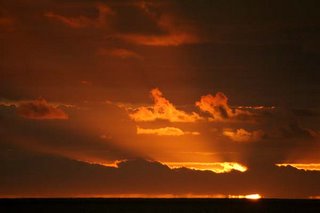
I'm off to Nadi tonight and then on to Nauru tomorrow morning. It was only through some amazingly lucky acrobatics that I managed to get a journalist's visa to enter Nauru. They have some pretty severe communication problems. The Department of Immigration is unable to communicate with the Foreign Affairs office, even though they are probably in the same building, and the fax of my passport I sent three weeks ago disappeared into the ether until Friday morning. Anyway, after a call to the Director of Immigration, I got things straightened out and he's used a loophole to get me an emergency visa, which he sent through the airline's computer system (and he sent a paper copy on the flight that arrives from Nauru today for me to pick up when I check in tomorrow). Anyway, it was only through about four turns of luck and one well-timed phone call that I will be allowed to go there. I'll be providing some background once I arrive, but I'm not sure how reliable the Internet service will be.
In the meantime, here is Suva Harbor last night.


10 December 2005
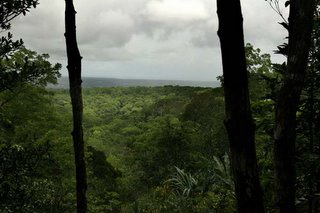
To escape the monotony of the city a bit, I spent Saturday hiking and taking pictures in Colo-i-Suva (pronounced tholo-ee-soo-va), a rainforest in the mountains about 30 minutes north of Suva. (Click on images to view larger versions.)
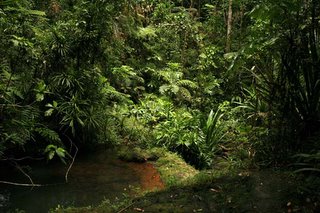
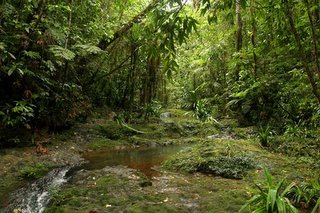
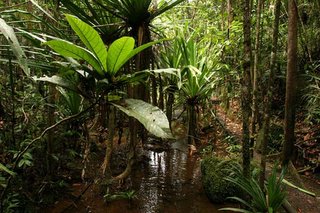
The trail skips back and forth across Waisila Creek, which provides the only real openings in the canopy and undergrowth.

The undergrowth is so bloody thick, I could have been standing next to an elephant and not known it, but I think there wasn’t much wildlife besides bugs and birds. Spiders make ready use of the open space along the trail.
I didn’t see anyone else on the trail—the forest is so dense that it has this isolating, insulating effect. You come onto a waterfall and can obviously hear the water splashing. Round a corner on the trail, just a few yards from the water, and the forest just swallows the sound. I don’t suppose anyone could hear you scream there, had there been anything to scream about.
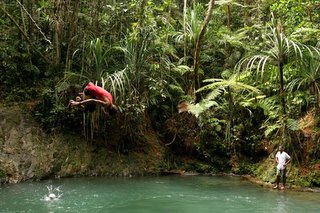

Far along the trail (or easily accessible from a dirt road on the other side of the park) are a few sets of old-fashioned swimming holes, one of which has a superlatively dangerous rope swing. I lacked the swimwear, and probably the cajones, to give it a try.

It could be lack of effort on my part, but I haven’t had a whole lot of traditional Fijian food, but I honestly think it’s not that easy to find. At a lodge near the park, kokoda (pronounced ko-kon-da) was the only traditional item on the menu. It’s a bit like a ceviche, except with coconut milk, and I’m determined to try and make it back in the States, but I'll understand if anyone is wary of trying my version.
08 December 2005
I made my grand debut on Fijian television last night: lingering shot of me scratching a mosquito bite on my shoulder as I sat in the audience at a media panel that Shalen invited me to observe. These panels, which are organized by the Fiji Times four times a year, feature three speakers from government and NGOs and then open the floor for questions from local journalists and the general public. The first hour is shown on Fiji One, the local television network.

They were talking about poverty in Fiji—a whole lot of double-talk, actually—but the aggressive moderator from a local radio station kept things on topic. It is a pretty remarkable way to make government ministers and MPs accessible to the public, even if they never actually say anything. The upshot is that poverty is likely increasing in Fiji, especially if one goes by the numbers on the public assistance rolls and the increasing rates of crime and prostitution.
I have received a number of warnings not to go out at night (except for in the very center of Suva, which has businesses that are open late), just like when I first visited Nairobi, although not as extreme. I wouldn’t characterize Suva as a dangerous city at all—there is a much more electrifying sense of dread walking the streets of Nairobi for the first time. That said, the warnings certainly quickened my pace at night. It was only one night that I made the walk from my hotel at the top of a hill down to the city proper. It is a 10-minute walk through a part of town that is a little seedy but bustling with shops and foot traffic. But unlike the shops in central Suva, they all close around five, making the walk a little harrowing, even to a seasoned New Yorker (albeit now in a golden age of safety in New York). My pace picked up a bit more when some sort of Indian junkie with a rag over his head walked directly toward me on the sidewalk and sort of half-heartedly tried to pin me against the wall. I pushed him out of the way (with a polite “excuse me,” strangely enough) and haven’t walked that stretch of road after 5:00 since. By contrast, I never would have even tried to walk outside in Nairobi at night in the brief time I was there. Luckily, I had no reason to go out at night there, and here taxis are abundant and cheap.
There is poverty in Fiji both rural—Indian farmers displaced when indigenous Fijians refused to renew their traditional long-term leases—and urban, where the lack of a minimum wage means that many city dwellers work hard for what is often simply too little money to make ends meet. Poverty is a problem for both indigenous Fijians and Indians, but from what I understand, the poorest of the poor are those displaced Indian farmers, while the overall rates of poverty are higher among indigenous Fijians.
There is simply no other place in the world—and anyone out there please feel free to correct me if I’m wrong here—with a situation quite like this. Two ethnic groups in roughly equal proportion. One is more financially successful, but is subject to seemingl appalling institutional discrimination—Indians essentially have no right to own land. The other has all the political power but have not done as well in business and therefore—perhaps rightfully—worry that, if Indians were given a level playing field, the indigenous Fijiana would be marginalized in their own land. Coups basically happen when Indians start to acquire more political power (at one time they made up more than half of the population, enough for a government mandate, but lost that majority to emigration following the coups).
It strikes me as odd that things are as peaceful as they are here. Imagine an America in which any minority wasn’t allowed, by law, to own land. Think about the dozens of countries around the world that have been through paroxysms of violence between ethnic groups over the last century. And here, it is not the institutionally disadvantaged people that stage coups or participate in violence, but those who hold most seats in government and have the power of the law behind them. It’s bizarre to me and I'm not going to understand it in a short time. Is there something in the Indo-Fijian character that allows it to happen? I’m quite sure that the situation is a fair measure more complicated than I am seeing it now and my American perspective certainly colors my approach. The pieces are not fitting together.
“Fiji is a paradox and a pity,” wrote Brij V. Lal, an expert of Fijian history from The Australian National University. So it is, I think.
I am going to try to go a little lighter in my last few days here in Fiji, taking some photos and commenting on cultural quirks. Also, please note that I changed the settings on the blog so anyone can comment on it, so you no longer have to sign up for a blogger account to comment. But it would be nice to know who leaves a comment.

They were talking about poverty in Fiji—a whole lot of double-talk, actually—but the aggressive moderator from a local radio station kept things on topic. It is a pretty remarkable way to make government ministers and MPs accessible to the public, even if they never actually say anything. The upshot is that poverty is likely increasing in Fiji, especially if one goes by the numbers on the public assistance rolls and the increasing rates of crime and prostitution.
I have received a number of warnings not to go out at night (except for in the very center of Suva, which has businesses that are open late), just like when I first visited Nairobi, although not as extreme. I wouldn’t characterize Suva as a dangerous city at all—there is a much more electrifying sense of dread walking the streets of Nairobi for the first time. That said, the warnings certainly quickened my pace at night. It was only one night that I made the walk from my hotel at the top of a hill down to the city proper. It is a 10-minute walk through a part of town that is a little seedy but bustling with shops and foot traffic. But unlike the shops in central Suva, they all close around five, making the walk a little harrowing, even to a seasoned New Yorker (albeit now in a golden age of safety in New York). My pace picked up a bit more when some sort of Indian junkie with a rag over his head walked directly toward me on the sidewalk and sort of half-heartedly tried to pin me against the wall. I pushed him out of the way (with a polite “excuse me,” strangely enough) and haven’t walked that stretch of road after 5:00 since. By contrast, I never would have even tried to walk outside in Nairobi at night in the brief time I was there. Luckily, I had no reason to go out at night there, and here taxis are abundant and cheap.
There is poverty in Fiji both rural—Indian farmers displaced when indigenous Fijians refused to renew their traditional long-term leases—and urban, where the lack of a minimum wage means that many city dwellers work hard for what is often simply too little money to make ends meet. Poverty is a problem for both indigenous Fijians and Indians, but from what I understand, the poorest of the poor are those displaced Indian farmers, while the overall rates of poverty are higher among indigenous Fijians.
There is simply no other place in the world—and anyone out there please feel free to correct me if I’m wrong here—with a situation quite like this. Two ethnic groups in roughly equal proportion. One is more financially successful, but is subject to seemingl appalling institutional discrimination—Indians essentially have no right to own land. The other has all the political power but have not done as well in business and therefore—perhaps rightfully—worry that, if Indians were given a level playing field, the indigenous Fijiana would be marginalized in their own land. Coups basically happen when Indians start to acquire more political power (at one time they made up more than half of the population, enough for a government mandate, but lost that majority to emigration following the coups).
It strikes me as odd that things are as peaceful as they are here. Imagine an America in which any minority wasn’t allowed, by law, to own land. Think about the dozens of countries around the world that have been through paroxysms of violence between ethnic groups over the last century. And here, it is not the institutionally disadvantaged people that stage coups or participate in violence, but those who hold most seats in government and have the power of the law behind them. It’s bizarre to me and I'm not going to understand it in a short time. Is there something in the Indo-Fijian character that allows it to happen? I’m quite sure that the situation is a fair measure more complicated than I am seeing it now and my American perspective certainly colors my approach. The pieces are not fitting together.
“Fiji is a paradox and a pity,” wrote Brij V. Lal, an expert of Fijian history from The Australian National University. So it is, I think.
I am going to try to go a little lighter in my last few days here in Fiji, taking some photos and commenting on cultural quirks. Also, please note that I changed the settings on the blog so anyone can comment on it, so you no longer have to sign up for a blogger account to comment. But it would be nice to know who leaves a comment.
06 December 2005
I know Fiji is lush, and I’ve scarcely seen more than the city and the agricultural fields that line the highway that circles the island. But tropical foliage with giant green leaves still bursts out of every open space. I suppose this is common on tropical islands, but these lush forests tend to be poor in diversity—it is one of the tenets of island ecology that islands, because they are small and can be tough for plants and non-flying animals to get to, are species-poor. In some ways, Fiji’s ecosystems are what you might expect. For example, it has no native mammals that are not bats.
(On a mammalian side note, I’ve seen a lot of small mammals scurrying around like squirrels in the U.S. One closer examination, I found they were Indian mongooses, which were brought to the island to control plantation pests but have spread to become one of Fiji’s most common wild animals and no doubt a serious threat to the island’s birds.)
But Fijian forests are unexpectedly diverse, with perhaps 3,000 species of plants, a third of which are found only on Fiji, and 100 species of birds, of which 25 are exclusive to the country. Incidentally, some of these birds have astoundingly cool names—the barking pigeon and the whistling dove, the red throated lorikeet and the pink billed parrot finch, the giant forest honey eater and the wandering whistling duck. It also has 30 native species of reptiles and amphibians, which are also uncommon on islands. There are a couple of reasons for this slightly surprising diversity. First, Fiji is made up of more than 300 separate islands, many of which are uninhabited, to which species can spread and diversify. Many of these islands have large hills or mountains, which provide a large range of different climates and ecosystems. And, by island standards, the main island of Fiji, Viti Levu, is relatively large. There is also the aquatic life, which I will get into in more detail when I finally get into the water.
A whisper of the lushness of Fijian forests can be found on the beautiful and sprawling grounds of the main campus of the University of the South Pacific. The buildings, which show the characteristic, dripping wear of all buildings in wet tropical climates, are scattered among palms, drooping trees and a wild, overgrown, mulch. It’s like a university campus was carved out of the forest primeval. I will be staying in a comfortable fan-cooled lodge there when I return to Suva in February.
I was on campus to visit the journalism department at the university, an undergraduate program with 60 students from around the region, four lecturers and an attractive monthly broadsheet student newspaper, Wansolwara, One Ocean-One People. I contacted Shailendra Singh, or Shalen, by email before I arrived. A lecturer in journalism who has a quiet authority and the clear respect of his students, Shalen was a journalist for 12 years, including writing for the Fiji Times, the major local newspaper. Now he is full-time at the university and is eager to expand the program’s offerings with post-graduate programs and—the reason for my visit—science, health and environmental journalism, which are not yet part of the curriculum.
So now I’m offering him some structural ideas and we’re working on a one-day seminar, scheduled for the week I will return to Suva in February, on environmental journalism. We’re planning to invite scientists (including from the university’s strong marine studies program) and local NGOs, including the WWF and GreenPeace, to talk to the students and local journalists about environmental issues. I think I’ll be speaking as well about my experience in the region and environmental journalism as a whole. That part has me a little nervous, as does the part where we discussed me giving interviews to some of his print and broadcast students, but I’ll get over it. It sounds like it will be fascinating and I think Shalen is going to make an excellent collaborator.
But that is a ways off, and Shalen will be doing most of the legwork while I am away. In the meantime, my week is actually filling up rapidly with meetings with officials and NGOs, and preparations for the trip to Nauru next week. I’m also getting a feel for the sticky currents of the city and looking forward to seeing a little more of it.
(On a mammalian side note, I’ve seen a lot of small mammals scurrying around like squirrels in the U.S. One closer examination, I found they were Indian mongooses, which were brought to the island to control plantation pests but have spread to become one of Fiji’s most common wild animals and no doubt a serious threat to the island’s birds.)
But Fijian forests are unexpectedly diverse, with perhaps 3,000 species of plants, a third of which are found only on Fiji, and 100 species of birds, of which 25 are exclusive to the country. Incidentally, some of these birds have astoundingly cool names—the barking pigeon and the whistling dove, the red throated lorikeet and the pink billed parrot finch, the giant forest honey eater and the wandering whistling duck. It also has 30 native species of reptiles and amphibians, which are also uncommon on islands. There are a couple of reasons for this slightly surprising diversity. First, Fiji is made up of more than 300 separate islands, many of which are uninhabited, to which species can spread and diversify. Many of these islands have large hills or mountains, which provide a large range of different climates and ecosystems. And, by island standards, the main island of Fiji, Viti Levu, is relatively large. There is also the aquatic life, which I will get into in more detail when I finally get into the water.
A whisper of the lushness of Fijian forests can be found on the beautiful and sprawling grounds of the main campus of the University of the South Pacific. The buildings, which show the characteristic, dripping wear of all buildings in wet tropical climates, are scattered among palms, drooping trees and a wild, overgrown, mulch. It’s like a university campus was carved out of the forest primeval. I will be staying in a comfortable fan-cooled lodge there when I return to Suva in February.
I was on campus to visit the journalism department at the university, an undergraduate program with 60 students from around the region, four lecturers and an attractive monthly broadsheet student newspaper, Wansolwara, One Ocean-One People. I contacted Shailendra Singh, or Shalen, by email before I arrived. A lecturer in journalism who has a quiet authority and the clear respect of his students, Shalen was a journalist for 12 years, including writing for the Fiji Times, the major local newspaper. Now he is full-time at the university and is eager to expand the program’s offerings with post-graduate programs and—the reason for my visit—science, health and environmental journalism, which are not yet part of the curriculum.
So now I’m offering him some structural ideas and we’re working on a one-day seminar, scheduled for the week I will return to Suva in February, on environmental journalism. We’re planning to invite scientists (including from the university’s strong marine studies program) and local NGOs, including the WWF and GreenPeace, to talk to the students and local journalists about environmental issues. I think I’ll be speaking as well about my experience in the region and environmental journalism as a whole. That part has me a little nervous, as does the part where we discussed me giving interviews to some of his print and broadcast students, but I’ll get over it. It sounds like it will be fascinating and I think Shalen is going to make an excellent collaborator.
But that is a ways off, and Shalen will be doing most of the legwork while I am away. In the meantime, my week is actually filling up rapidly with meetings with officials and NGOs, and preparations for the trip to Nauru next week. I’m also getting a feel for the sticky currents of the city and looking forward to seeing a little more of it.
04 December 2005
Among the four television stations I get in my motel room in Suva, via a satellite dish out back that is larger than my room, is ZeeTV, an Indian satellite network that my parents and many other South Asian Americans—scratch that, Indians all over the world—get for their regular fix of Bollywood films and music videos. The prominence of Indian popular culture should come as no surprise in a country that is 44 percent Indian. The post-colonial history of Fiji is littered with strife between Indo-Fijians, some of whom who have been in Fiji for more than four generations, and the indigenous Fijians, who are Melanesian, or darker-skinned Pacific people. In fact, this conflict appears to be the defining characteristic of economics and politics here since independence.
Most of these Indians came to Fiji to cut sugar cane in the late 19th and early 20th centuries, when both Fiji and India were British colonies. With few prospects when their five-year contracts were up, some stayed in Fiji. Prevented from owning land by local laws and largely alienated from indigenous Fijian society, many started small businesses or took jobs in the colonial bureaucracy. With time, the community built a measure of political and economic clout, but true social integration with the Fijians never really happened.
Independence came in 1970 and the racial divisions in Fiji persisted. Things went haywire—try to keep up here—in 1987, when there were two violent coups within just four months led by an indigenous Fijian group, called Taukei, that alleged that the government was dominated and controlled by Indo-Fijians. Following the coups many Indo-Fijians left. Even more left after a new constitution drafted in 1990 was heavily stacked for indigenous Fijians. A 1997 revision made it more equitable and then a coalition government came to power in 1999. Swell, right? The progress was short-lived. The next year saw yet another coup in which government offices were stormed and the Indo-Fijian prime minister was taken hostage. The 1997 constitution got revoked, but then later the rebels were arrested on charges of treason, after they were tricked by the military commander into threatening the life of president when they were unhappy with the choice of prime minister. So then the last coup was ruled invalid. Whew. I lost my train of thought. What was I talking about again?
The upshot of all of this is that indigenous Fijians now control most of the government, tourism went in the tank and more Indians—especially those professionals who can afford it—have left. And while I have seen indigenous Fijians and Indo-Fijians both rich and poor here, I can’t begin to pretend to understand what the current racial/political situation is here right now except to say that it is probably still a very touchy subject. From all I’ve read, it sounds like just a matter of time until there is another coup.
Despite the problems, it appears Fiji is growing into its role as a hub and leader in the South Pacific. While it may be smaller than New Jersey, it is the biggest island country and economy in the South Pacific, many regional bodies reside in Suva and Nadi is a major travel hub. If the country could ever sort itself out, it might grow into some kind of regional powerhouse and people might start flooding back to its great beaches from all over the world.
I saw a bunch of these beaches on the five-hour bus ride from Lautoka to Suva. They certainly look nice, but I’m much more interested in what’s under that calm blue surface. Tomorrow I might go hunting for dive shops and travel agents that can get me to some of the other islands, which are where the best diving is supposed to be.
Also, today I met with some great people from the journalism program at the University of the South Pacific. We’ve already got some plans in motion and they’ve been incredibly helpful already. More on that visit later.
Most of these Indians came to Fiji to cut sugar cane in the late 19th and early 20th centuries, when both Fiji and India were British colonies. With few prospects when their five-year contracts were up, some stayed in Fiji. Prevented from owning land by local laws and largely alienated from indigenous Fijian society, many started small businesses or took jobs in the colonial bureaucracy. With time, the community built a measure of political and economic clout, but true social integration with the Fijians never really happened.
Independence came in 1970 and the racial divisions in Fiji persisted. Things went haywire—try to keep up here—in 1987, when there were two violent coups within just four months led by an indigenous Fijian group, called Taukei, that alleged that the government was dominated and controlled by Indo-Fijians. Following the coups many Indo-Fijians left. Even more left after a new constitution drafted in 1990 was heavily stacked for indigenous Fijians. A 1997 revision made it more equitable and then a coalition government came to power in 1999. Swell, right? The progress was short-lived. The next year saw yet another coup in which government offices were stormed and the Indo-Fijian prime minister was taken hostage. The 1997 constitution got revoked, but then later the rebels were arrested on charges of treason, after they were tricked by the military commander into threatening the life of president when they were unhappy with the choice of prime minister. So then the last coup was ruled invalid. Whew. I lost my train of thought. What was I talking about again?
The upshot of all of this is that indigenous Fijians now control most of the government, tourism went in the tank and more Indians—especially those professionals who can afford it—have left. And while I have seen indigenous Fijians and Indo-Fijians both rich and poor here, I can’t begin to pretend to understand what the current racial/political situation is here right now except to say that it is probably still a very touchy subject. From all I’ve read, it sounds like just a matter of time until there is another coup.
Despite the problems, it appears Fiji is growing into its role as a hub and leader in the South Pacific. While it may be smaller than New Jersey, it is the biggest island country and economy in the South Pacific, many regional bodies reside in Suva and Nadi is a major travel hub. If the country could ever sort itself out, it might grow into some kind of regional powerhouse and people might start flooding back to its great beaches from all over the world.
I saw a bunch of these beaches on the five-hour bus ride from Lautoka to Suva. They certainly look nice, but I’m much more interested in what’s under that calm blue surface. Tomorrow I might go hunting for dive shops and travel agents that can get me to some of the other islands, which are where the best diving is supposed to be.
Also, today I met with some great people from the journalism program at the University of the South Pacific. We’ve already got some plans in motion and they’ve been incredibly helpful already. More on that visit later.
02 December 2005
Valmiki is now actually in the South Seas. After a long flight in which Dec. 2, my father's birthday, somehow disappeared--I'm not discounting the possibility of some kind of time warp over the Central Pacific--I arrived in Nadi on the Western coast of Fiji. Nadi is Fiji's third largest city and major tourism hub, but is clear across the island from Suva, the capital and my destination. I never actually saw Nadi, as I went straight from the airport to Lautoka, a sleepier town 30 km to the north, where a contact recommended I stay. The sun is high and hot, but the town is active with Indians and native Fijians playing footie in the park and haggling over fresh fruits and vegetables in the outdoor market. But I'm spending most of the day on the phone and the Internet getting in touch with contacts and trying to ensure I have a place to stay when I arrive in Suva tomorrow afternoon. After much contemplation and soul-searching, it looks like I will be staying, at least for a couple of nights, at the Motel 6.
More general observations, and some photos and environmental/science/cultural background to come.
More general observations, and some photos and environmental/science/cultural background to come.
